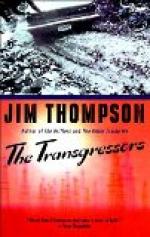With these words of encouragement ringing in his ears, Trueman departs. He has yielded to the human weakness which prompts a man to confide his inmost thoughts to woman. Kingdoms have been destroyed, empires have crumbled in a day; the world’s greatest generals have seen their carefully designed campaigns fall flat, all through the treachery of women in failing to keep secret the confessions of their confidants.
The admission that Trueman has made of his misgivings as to the result of the election, if it were made public, would shatter his every chance. The world will not lend its support to a man or a cause that admits its hopelessness. A forlorn hope, however forlorn, has never wanted volunteers.
Fortunately Trueman has made a confidant of a woman unselfishly and devotedly his friend, and who has the good sense to realize that his untrammeled utterances to her are for her alone.
It is eleven o’clock when Trueman reaches his party’s headquarters. He finds his supporters working with the feverish energy that attaches to a desperate situation. The soldiers of a beleaguered fortress man the guns with a disregard to fatigue and danger that is inspiring; the men at the pumps, when the word goes forth that the ship is sinking, work with a frenzy that defies nature; so it is with the leaders of the Independence party. They are fighting against appalling odds, yet they do not stop to question the result. “Work, work, work!” is the command they obey.
“The indications from the Southern States are brighter than ever,” one of the committeemen tells Trueman.
“Judge for yourself,” adds another, and he hands the candidate a telegram. It is from New Orleans. Trueman reads it aloud:
“CHAIRMAN BAILEY, National
Headquarters, Independence
Party, Chicago, Ill.:
From a canvass of the cotton belt the indications are that our party will carry all the Southern States with the possible exception of Louisiana. This doubtful state can be carried if speakers are sent there.
(Signed) EDWARD B. MASON.”
“Is there any way of complying with this request?” Trueman asks.
“We may be able to send three speakers down there the latter part of the week,” says the Chairman of the Speakers Committee, after consulting his schedule.
“Have you heard from New York to-day?” Trueman is asked by the Treasurer. “You know we have been expecting to hear the result of the forecast there.”
“No, I have had no word. It is barely possible that the message has been intercepted.”
As Trueman speaks the telegraph operator approaches and hands him a message.
“Here is the message!” cries Trueman. “It is from Faulkner. He says that the city of New York will be about evenly divided; and that in the state we can rely upon the counties along the canal. He ends up by stating that the result in Greater New York may be assured if I can go there and fight in person.”




